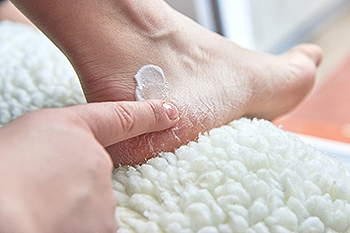Cracked Heels and Diabetes

The skin on the heels of the feet can become dry and cracked, which can turn into deep, painful fissures. Cracked heels are unattractive and can be uncomfortable. Cold weather and lower humidity can cause this kind of cracking, in addition to hot showers, harsh soaps, and dehydration. Diabetic patients are prone to having foot problems, including cracked heels. With nerve damage common among people who are diabetic, it is difficult for them to retain natural skin oils and moisture in their feet. Without medical attention, cracked heels in diabetics can result in infection and other complications. Proper foot care can help alleviate cracked heels. This includes regularly examining the feet, and washing, drying, and moisturizing the feet each day. If you have diabetes and have cracked heels or other foot problems, it is strongly suggested that you visit a chiropodist for an examination and treatment plan.
Diabetes can cause serious problems in the lower limbs if proper preventive measures are not taken and diabetic wound care is not performed. If you would like to learn more about caring for diabetic feet, please consult with one of the specialists from Thornhill Foot Clinic. Our chiropodists can help you maintain the health of your lower limbs and your mobility.
Diabetes can lead to a host of foot and ankle complications, including:
Poor circulation
Peripheral neuropathy
Diabetic foot wounds and ulcers
Infection
Corns and calluses
Dry, cracked skin
Nail disorders
Hammertoes
Bunions
Charcot foot
If you have diabetes, you must be vigilant of any changes in your foot health. This is best done through daily foot inspections. Using a mirror to help you if necessary, look for any:
Cuts, scrapes, sores, or wounds
Bruising or discoloration
Swelling
Rash
Foul odor
Nail changes
Hair loss
Warmth and inflammation
Deformities
Lower limb pain
Strange sensations (numbness, tingling, burning, pins, and needles)
If you detect anything unusual, seek the care of a chiropodist as soon as possible. If you have any questions, please feel free to contact our office located in . We offer the newest diagnostic and treatment technologies for all your foot care needs.
